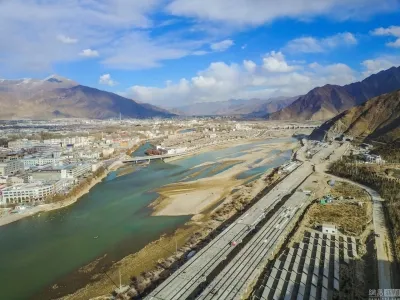How is China's Expansion Affecting Tibet's Ecology?

Synopsis
Key Takeaways
- Tibet's ecological crisis demands urgent international attention.
- China’s infrastructure projects are leading to severe environmental degradation.
- The Tibetan Plateau is warming at more than double the global average.
- Transparent monitoring and governance are essential for sustainable management.
- Protecting Tibet is crucial for the environmental stability of nearly two billion people.
New Delhi/Stockholm, Oct 6 (NationPress) A report released by the Stockholm Centre for South Asian and Indo-Pacific Affairs (SCSA‑IPA) at the Institute for Security and Development Policy (ISDP), has urged governments, research institutions, and civil society to prioritize the Tibetan Plateau in international climate policy discussions. It has criticized China’s state-centric approach to infrastructure development, militarization, and resource extraction, which has turned one of the planet’s most sensitive ecosystems into a region facing severe ecological stress.
As the UN prepares for the upcoming COP30 climate conference in November in Brazil, the report emphasizes that Tibet should no longer be overlooked in global environmental governance, as the ongoing crisis on the 'Roof of the World' is influencing the future of water, food, and energy security across the Indo‑Pacific and beyond.
The new Stockholm Paper titled 'Wither Tibet in the Climate Crisis Agenda?' features insights from over 20 international experts who analyze the rapid ecological decline of the Tibetan Plateau and its extensive repercussions for water security, regional stability, and global climate governance in Asia.
The study highlights that the Tibetan Plateau, often termed the 'Third Pole', is warming at a rate more than double the global average.
Its glaciers are retreating, permafrost is melting, and grasslands are deteriorating, jeopardizing the fragile water systems that sustain nearly two billion people across South and Southeast Asia.
Despite its critical global significance, Tibet remains largely absent from international climate diplomacy, including frameworks like the UN Framework Convention on Climate Change (UNFCCC) and various COP negotiations.
The report criticizes Beijing, pointing out that the ecological crisis in Tibet is directly linked to governance and development decisions made by China.
It asserts that China's state-centric approach to infrastructure expansion, militarization, and resource extraction has transformed one of the world's most delicate environments into a zone of extreme ecological stress.
Extensive construction of highways, railways, airports, and hydropower dams—many intended for dual civilian and military use—has disrupted permafrost layers, fragmented alpine ecosystems, and displaced local communities.
The report illustrates how Beijing’s concept of an 'ecological civilization' conceals a trend of environmental degradation, lack of transparency, and limited accountability.
Military-driven construction and high-altitude exercises are exacerbating the pressures on already unstable landscapes, while the secrecy surrounding environmental data obstructs meaningful global assessments.
One of the paper’s most pressing concerns is the expansion of hydropower projects on the Yarlung Tsangpo (the Tibetan name for the upper section of the Brahmaputra).
The proposed Medog mega-dam, projected to cost over $160 billion, symbolizes the ambition to transform Tibet into a hydropower superbase. However, experts caution about potential seismic risks, landslides, and irreversible damage to downstream ecosystems in India and Bangladesh.
The absence of transparent impact assessments or data-sharing mechanisms amplifies fears that water could become a tool for geopolitical manipulation.
Additionally, the extraction of critical raw materials like lithium, copper, and Rare Earth elements has turned Tibet into a center for strategic resource extraction. These materials are essential for global green-energy transitions, yet their extraction in Tibet occurs with minimal environmental regulations and a lack of local community engagement.
The Stockholm Paper characterizes this phenomenon as 'extractive colonialism', where the costs of global sustainability are disproportionately borne by one of the planet’s most vulnerable ecosystems.
The resulting pollution, deforestation, and cultural displacement threaten both environmental justice and human security. The human aspect of Tibet’s transformation is equally alarming.
Since 2000, nearly one million Tibetans have been forcibly relocated under programs purporting to promote ecological protection or alleviate poverty.
Many have faced multiple displacements, often without just compensation or sustainable livelihoods. These relocations, combined with demographic engineering and assimilationist education policies, erode cultural identity and weaken the traditional stewardship that has safeguarded Tibet’s high-altitude ecology for centuries.
When local populations are removed from their ancestral lands, centuries of ecological knowledge vanish with them. Despite Tibet’s crucial role in regulating Asia’s water and weather patterns, global responses remain tepid.
Political sensitivities regarding Chinese sovereignty have hindered international dialogue even as environmental limits are being exceeded.
The Stockholm Paper advocates for treating Tibet as a frontline in the global climate emergency, comparable in urgency to the Arctic or low-lying island nations. The stability of the plateau is vital for monsoon patterns, biodiversity corridors, and continental climate regulation.
To confront these challenges, the publication offers a 10-Point Framework for Global Action aimed at integrating Tibet into international climate cooperation.
This framework suggests, among other initiatives, establishing transparent, independent monitoring systems utilizing satellite and hydrological data under UN or multilateral supervision; developing formal transboundary water governance mechanisms, including a potential Brahmaputra Basin Commission; and enhancing climate accountability by linking green finance and trade to stringent environmental and social safeguards.
Together, these recommendations seek to foster transparency, accountability, and regional collaboration.
The Stockholm Paper emphasizes that safeguarding Tibet is not merely a political action but an ecological necessity that transcends national boundaries. Its degradation poses a threat to Asia’s hydrological equilibrium, undermines global carbon stability, and endangers the livelihoods of nearly one-third of humanity.









